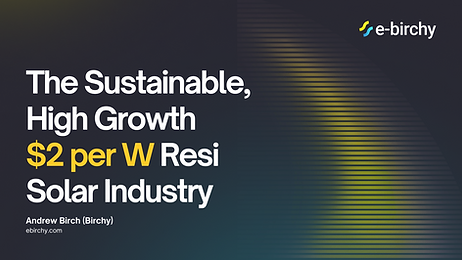
Policy
Policy
The Repeal of the ITC: Let’s Cut the Costs. Let’s Own Our Future.
We took data on the cost breakdown of solar installation costs for the USA vs other main solar markets. We have used international best practice and deep knowledge of the US cost stack and impact of permitting, to lay out a line-by-line cost reduction plan to half the cost of solar in the US. A core part of this is automating permitting which has a huge cost and time impact on US installations. This requires the use of tools like SolarAPP+, which is a non-profit we started that allows digital automated instant permitting for solar and storage projects in jurisdictions that have approved its use.
See the data for yourself, here.
How to cut solar costs by 50% in the U.S.
Why is solar 2.5x more expensive in the U.S. than in Australia? What happens when the solar tax credit disappears?
Birchy explains how local businesses can still win by automating permitting, cutting hardware and overhead, and selling smarter with tools like OpenSolar. No subsidies needed. Just a faster, leaner solar economy that saves homeowners up to 75% and unlocks $300 billion in growth.
The Path to a Sustainable, High-Growth $2/W Resi Solar Future
The US residential solar industry stands at a crossroads. At today’s $5.18/W with storage, homeowners pay too much, demand risks falling, and the clean energy transition could stall. But there’s a clear path forward: $2/W solar. Click here for the practical path to achieving $2/watt solar in the US.
To solve the climate crisis, it’s critical that we focus on growing solar at 25% per annum, as the number one climate lever.
The Solar S-Curve can solve most of the climate challenge in a decade - and we’re so low-cost we don’t need subsidies, we only need an open, fair and transparent energy market, here’s the three simple policies to achieve that:
1
Embrace Open Pricing: Let solar and storage and EV’s compete on price. Don’t add tariffs on cleantech, the jobs are all local, not in manufacturing. Remove all energy subsidies, nobody needs it.
2
Cut Red Tape: Digitize and automate permitting and interconnection, to ensure speedy connection to the grid.
3
Enact Electric Protocol, a standard set of rules for the world-wide-grid with uniform market-price treatment for all energy sources, of any size, connecting to the grid. These allow all consumers and prosumers to access the time-of-day value of energy and the value of other services they provide to the grid (e.g. batteries can peak shave, regulate frequency, avoid infrastructure spend on the grid – battery owners should be compensated, so consumers get lowest cost grid)
That’s it! No money, no support, just an open market.
If you’re a policy-maker, please read my latest whitepaper (co-authored with Professor Andrew Crossland, Durham University Energy Institute) written for Ed Miliband, the UK’s Secretary of State for Energy Security and Net Zero.
Whitepapers
